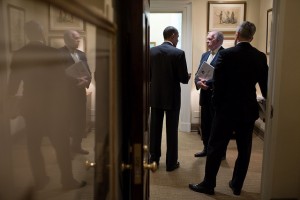I well remember when Robert Grenier testified at Scooter Libby’s trial. His performance – like most of the witness testimony — was a performance. But I was more intrigued by the response. Even the cynical old DC journalists were impressed by the smoothness of the performance. “You can tell he was a great briefer,” one journalist who had written a book on the CIA said.
Today, he takes up the role of bogus pushback to the Senate torture report, complete with all the false claims about the report, including:
- SSCI should not have relied exclusively on documents — which, if true, is an admission that millions of CIA’s cables are fraudulent and false
- The claim that members of the Gang of Four were briefed earlier and more accurately than even CIA’s own documents show them to have been
- SSCI — and not CIA — made the decision that CIA officers should not testify to the committee
- That a report supported by John McCain and Susan Collins is a Democratic report (Grenier also claims all involved with it know history from history books, not — as McCain did — from torture chambers)
- That the CIA cables exactly matched the torture depicted on the torture tapes (see bullet 1!), and that CIA’s IG reported that, both of which are false
But perhaps Grenier’s most cynical assertion is his claim — in a piece that falsely suggests (though does not claim outright) that Congress was adequately briefed that Congress’ job, their sole job, is to legislate, not oversee.
A second, related reason would be to build support for comprehensive legislation — that is what Congress is supposed to concern itself with, after all — to remove any of the interpretive legal ambiguity which permitted coercive interrogation to be considered in the first place, and ensure it never happens again.
It is a cynical move, but given the rest of his argument, the part that I find compelling, necessary.
Because Grenier warns Dianne Feinstein that her attack on the Presidentially authorized counterterrorism methods of the past will chill President Obama’s preferred presidentially authorized counterterrorism methods — drone strikes — going forward.
It is not just the past which is at stake, but the present and the future as well. Make no mistake — those currently serving in CIA are watching these developments closely.
Senator Feinstein, we are told, though having great moral qualms about vigorously interrogating terrorists, appears to have no particular compunction about killing them — so long as it is done remotely, with little direct contact with the gruesome details. As anyone reading the press will know, the current, Democratic administration has shown great enthusiasm for directed killings, employing drones in lethal operations around the world to an extent that might have shocked their Republican predecessors in the Bush administration. Death by video game has its attractions, particularly for those lacking intestinal fortitude. It enables them to avoid confronting the essential and unavoidable brutality of what they are doing.
Just as was the case with harsh interrogations during the last administration, the current resort to directed killings, including so-called “signature strikes,” in which the specific identities of those targeted are unknown, though remarkably uncontroversial at the outset of the current administration, has become anything but uncontroversial since. Should the perceived threat from various bits of ungoverned, terrorist-dominated geography around the globe diminish, the controversy involving drone strikes will only grow further. At some point soon, if they haven’t already, the tribunes of the people in the U.S. Congress will begin to wonder about the political wisdom of their association with directed killings.
They needn’t worry — they have already demonstrated their ability to avoid all responsibility — but those charged with carrying out such strikes should, and they know it. Those in both the White House and the Congress who have chosen to comfort themselves by propagating the myths associated with drone strikes — that they are universally “surgical,” always precisely targeted, and that any civilian casualties associated with them are rare — will inevitably find themselves shocked — perhaps “chilled” is the word — by reality when political calculation dictates that they examine it more closely. Drone strikes, like any other aspect of war, are far more messy and imprecise than advertised, involving subjective judgments easily vulnerable to second-guessing and ex-post-facto recrimination. They benefit only by comparison with more primitive methods, including ground attacks and conventional air strikes, but those comparisons will no longer matter when political interest moves in the other direction. Some successor to Dianne Feinstein may well soon find political cover or political advantage, as the case may be, in a thorough, negative investigation of the drone program — we can watch for it.
I told you CIA would invoke Obama’s drone strikes to limit the damage of the torture report.
To be sure, there is already evidence CIA is lying to Congress about drone strikes, just as it lied about torture, particularly about the numbers of civilians it has killed. Yet DiFi has willfully continued to believe those lies, to believe the CIA’s purportedly better record on drone strikes stems from some inherent skill and not the preference of foreign partners to work with a malleable CIA rather than DOD.
Grenier is absolutely right that Congress and the White House want to be lied to on this point.
Grenier then launches a more interesting implicit threat — that CIA will stop doing what the President demands under Article II.
In my own time in CIA, as perhaps in all times, there were those inside the organization who preached that the Agency should steadfastly avoid presidential directives to affect or shape events, rather than just report on them. “Stick to traditional intelligence collection,” they’d say. We hear similar voices now. But presidents always feel otherwise. Every president confronts foreign policy challenges for which a cheap, clandestine solution appears tempting. Given CIA’s unique capabilities, it’s often the right thing to do. But the opportunities to frustrate the president’s wishes and avoid such entanglements are rife for those who are so inclined. There is even a term for it: “slow rolling.” Current events, and the anticipated Senate report, will greatly strengthen the hand of the slow-rollers. It’s hard to disagree with them now.
[snip]
Rather than taking responsibility for changes in counterterrorism policy on itself, it is a far safer, if more insidious course — one instinctive to Congress — to abuse the CIA to the point where it self-regulates. But as noted above, there are serious downsides to that approach. U.S. national security will not be served by fostering a culture within CIA in which the organization decides for itself which of its lawful orders it will choose to follow, and makes those judgments based on what CIA officers consider best for themselves and their institution, rather than on what their elected masters deem best for the country. That is not the way the system is supposed to work. The federal bureaucracy is supposed to follow legal orders. That is what CIA has always done, frequently to its cost, and that is what the American people need it to do. If they don’t like what their elected leaders have done, they can throw them out. They shouldn’t look to CIA to make these decisions for them — on their own, and for their own purposes.
Ostensibly, this talk about slow rolling the President’s Findings is about drone strikes. Except that the President is re-launching the war in Iraq even as we speak, based solely on Article II authority (I presume JSOC features as prominently as CIA, but CIA clearly has been on the ground for some time).
The implicit threat: if SSCI continues to push, both the President and the Democrats who want to respond to ISIS without declaring war will regret it.
Even here, Grenier is full of shit. He makes no mention of the structure of the September 17, 2001 Gloves Come Off Finding, which itself outsourced most substantive decisions to CIA. It’s one thing to demand Congress do something about that — and they should — and yet another to suggest the rest of Obama’s covert operations employ such structure (though I wouldn’t put it beyond the National Security establishment). Moreover, the abundant evidence (in CIA’s own records, which Grenier treats both as accurate and as inaccurate!) that CIA ignored even the limits imposed by DOJ makes their actions illegal, regardless of what order Bush originally gave.
The problem is the orders — both to torture and to drone strike. But it is also the type of relationship Cofer Black and Dick Cheney embraced (and Obama has retained, at least with respect to the Gloves Come Off MON).
Which is why this is my favorite line from Grenier’s piece.
Goodness. If even a substantial portion of this were true, I would be among the first to advise that CIA be razed to the ground and begun all over again.
This is coming (as Grenier alludes to but doesn’t fully lay out, just as he lays out the suggestion that CIA resumed torture after he refused in early 2006) from a guy who tried to stay within the law, stopped torturing after the Detainee Treatment Act forbade it. It is, perhaps, the best line, given the impasse we’re at.
CIA has become the instrument of illegal actions, an arm of the Executive that evades all law, precisely because of its corrupted relationships with both the Executive and Legislative branch.
So, I take you up on the suggestion, Robert Grenier. Let’s raze the damn thing and — if a thorough assessment says a democracy really needs such an agency, which it may not — start over.



